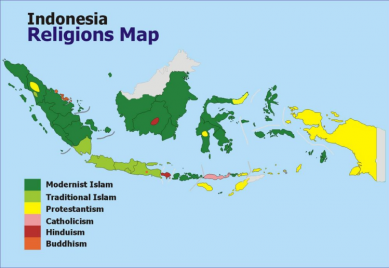Some Christians accept Indonesia bill seen favoring Muslims

While the United Nations and some political groups feel threatened by Indonesia's Mass Organization bill, some Christians in the world's fourth most populous country say the bill might be needed.
Maxixe Mantofa, an elder at Gereja Mawar Sharon Church in Surabaya, East Java said the bill could help limit activities detrimental to peace-seeking organizations.
He also believes if clearly written the bill could create equality for all organizations and restrict those that intimidate others.
"[The] Mass Organization Bill is better established so that not just anyone stands for God to judge people at random.
"The Bill should not castrate religious rights, or establishing places of worship, but rather restrict gatherings among members of mass organizations and then find activities that are detrimental to other innocent parties," Mantofa said in a written statement.
Indonesia is known for religious pluralism, but a recent report by Human Rights Watch documented harassment and assaults experienced by religious minorities from Islamic militant groups.
Titled In Religion's Name: Abuses against Religious Minorities in Indonesia, the 107-page report published in February attributed violence and intolerance against Ahmadis, Shias, and Christians on the government's failure to act decisively and prosecute perpetrators.
The Ahmadis and Shias are minority Muslim groups in Indonesia which is the world's most populous Islamic nation.
The draft law says organizations have to maintain religious values in Indonesia, the world's largest Muslim country where about 86 percent of the 248 million people are followers of Islam, 6 percent are Christians and some 2 percent are Hindus.
Erfan Simanjuntak, a member of the Evangelical Church of Indonesia in Bandung, also welcomed the Mass Organization Bill.
Simanjuntak believed that with some fine-tuning on the bill's provision requiring organizations to draft constitutions and bylaws and to register might not pose a problem on the freedom of association, expression, and religion for Christian Indonesians. Bandung is the capital of West Java in Indonesia.
"Because freedom without control surely disturbs and threatens other persons or groups... Control was reasonable because that's the function of the state," said Simanjuntak.
Mantofa and Simanjuntak's opinions echoed others Indonesians stand on the bill before the House of Representatives.
Nining Suprapto, a Jakarta Post reader from the capital city was quoted in the newspaper saying the mass organization bill is needed to regulate organizations involved in crimes.
Bambang Utomo, also from Jakarta, said a bill aimed at disbanding organizations whose members carry out violence is welcomed.
Another Jakarta resident who voiced an opinion through the Jakarta Post Readers Forum, M. Adikoesoemo believes the Indonesian government should have worked on a mass organization bill since Indonesia's inception to limit altercations between religious organizations.
On Feb. 14, a U.N. specialist urged Indonesia lawmakers to modify the bill and ensure its consistency with international human rights norms and standards.
Heiner Bielefeldt, U.N. Special Rapporteur on freedom of religion or belief, stated that the bill's provisions could violate freedom of religion or belief and are contrary to Indonesia's democratic platform.
The U.N.'s statement was followed by a protest in Indonesia's capital of Jakarta attended by members of the Commission for Missing Persons and Victims of Violence (Kontras), Imparsial, the Institute for Research and Advocacy (Elsam) and the Prosperous Labor Federation (KSB). According to the Jakarta Post, protesters claimed the bill would infringe on people's right to freedom of assembly and expression.